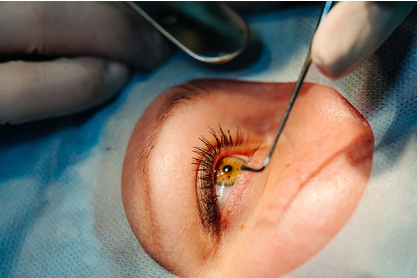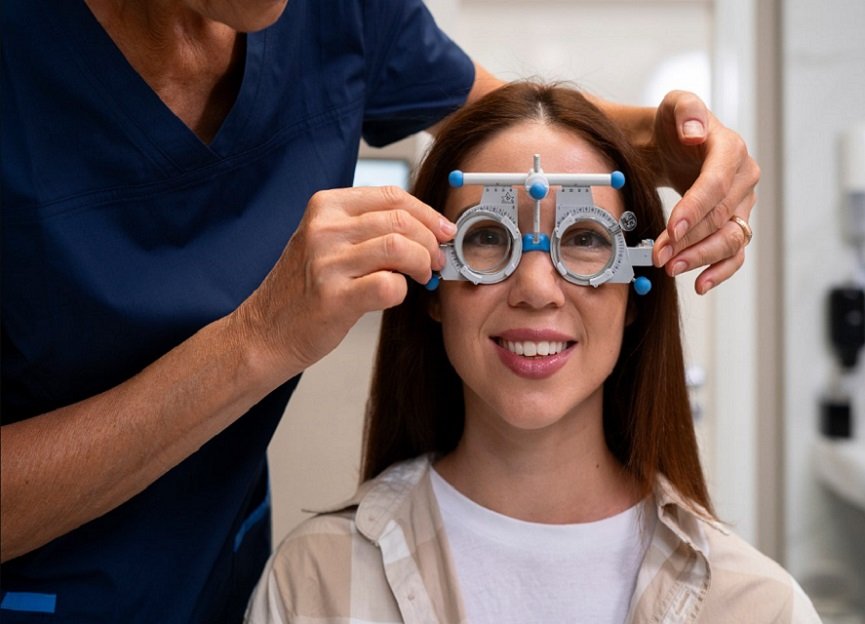
Imagine waking up one morning and realizing that your world has become a bit hazy. Colors aren't as vibrant, and the little details you once took for granted are now blurred. This could be a sign of cataracts—a common eye condition affecting millions worldwide. If you've been struggling with vision changes, it might be time to consider whether cataract surgery is the right choice for you.
Cataracts develop slowly over time, often without any noticeable symptoms until they significantly impact daily life. Knowing when to seek help from an eye specialist can make all the difference in preserving your sight and quality of life. In this blog post, we’ll explore what cataracts are, how they form, signs that indicate you may need surgery, and what to expect during the procedure itself.
👉 Think your vision is getting worse? Book a consultation with AIY Eye Care in Ghaziabad today and get expert advice.
If you're searching for answers or wondering about options like motiyabind surgery or finding the best eye doctor in Ghaziabad for cataract surgery, keep reading! Your journey towards clearer vision starts here.
What are Cataracts and How Do They Develop?
Cataracts are a clouding of the eye's natural lens, which is crucial for focusing light onto the retina. This condition often develops as a part of the aging process but can also occur due to other factors.
The lens is primarily made up of water and proteins. Over time, these proteins may begin to clump together, forming cloudy areas that hinder clear vision. Initially, you might not notice significant changes in your sight.
👉 Start your journey to clearer vision—schedule an eye exam with AIY Eye Care in Ghaziabad.
Certain lifestyle choices and medical conditions can accelerate cataract development. For instance, prolonged exposure to UV rays or smoking can contribute to their formation. Additionally, diabetes and long-term use of corticosteroids have been linked with an increased risk.
Understanding how cataracts develop helps in recognizing early signs and seeking timely intervention from a cataract specialist when necessary.
Common Signs and Symptoms of Cataracts
Cataracts can sneak up on you, often developing slowly over time. One of the first signs is blurred or cloudy vision. Colors may appear faded or less vibrant than before.
You might also notice difficulty seeing at night, making driving challenging. Glare from headlights can be bothersome too, leading to discomfort in bright environments.
👉 Noticing any of these symptoms? It’s time to get your eyes checked at AIY Eye Care in Ghaziabad.
Frequent prescription changes for glasses are another red flag. If your vision seems to change rapidly despite corrective lenses, it’s worth a visit to an eye specialist.
Double vision in one eye can occur as well. This symptom may seem unusual but is commonly associated with cataract formation.
If you've experienced any of these issues, don’t hesitate to consult a cataract specialist like AIY Eye Care. Early detection and intervention are key to maintaining clear vision and overall quality of life.
"Duniya ko fir se HD mein dekhna hai?
👉 Schedule your cataract consultation with AIY Eye Care in Ghaziabad and bring brightness back into your life!
Factors That Increase Your Risk for Cataracts
Cataracts develop gradually, but certain factors can accelerate their onset.
Age is a primary culprit; as we grow older, the proteins in our eyes begin to break down, leading to cloudiness.
Lifestyle choices also play a significant role. Smoking and excessive alcohol consumption can hasten cataract formation. It's essential to be mindful of these habits.
Medical conditions are another contributing factor. Diabetes significantly increases your risk due to elevated blood sugar levels affecting eye health over time.
Prolonged exposure to UV light from the sun may raise vulnerability too. Wearing sunglasses with UV protection isn't just stylish—it’s smart for your vision.
Some medications like corticosteroids have been linked to cataract development, underscoring the importance of discussing all prescriptions with your doctor. Awareness of these risks empowers you toward proactive eye care decisions.
When to Consider Cataract Surgery
Cataract surgery becomes a consideration when daily life is impacted. If you struggle with activities like reading, driving, or watching television due to cloudy vision, it’s time to seek advice.
Noticing frequent changes in your prescription glasses can also signal the need for surgical intervention. When standard treatments fail to restore clarity, cataract surgery may be the best option.
Another key factor is safety. If blurred vision poses risks while driving or navigating stairs, don’t hesitate to consult an eye specialist.
When glare from lights becomes unbearable at night or during sunny days, it's essential to reconsider your situation too.
Discussing your symptoms with a cataract specialist will help determine if surgery aligns with your lifestyle and visual needs. Taking this step can significantly enhance both quality of life and independence.
Don’t ignore the signs of cataracts—book your eye exam today with our experienced specialists at AIY Eye Care in Ghaziabad.
The Procedure: What to Expect Before, During, and After Surgery
Before cataract surgery, you’ll have a comprehensive eye exam. Your doctor will measure your eyes to determine the appropriate lens for your vision needs. You may receive instructions on how to prepare, including which medications to avoid.
On the day of the procedure, you'll likely be given a sedative to help you relax. The surgery itself is quick—typically lasting about 15-30 minutes. An eye surgeon will use advanced techniques and tools to remove the cloudy lens and replace it with an artificial one.
Afterward, you may experience some discomfort or blurred vision. It’s essential to follow post-operative care instructions closely, which often include using prescribed eye drops and avoiding strenuous activities for a short period. Most patients notice significant improvements in their vision within days as they adjust to their new lenses.
Ready to see clearly again? Learn more about motiyabind surgery at AIY Eye Care in Ghaziabad and take the first step toward better vision.
Recovery and Results: What to Expect After Cataract Surgery
After cataract surgery, many patients notice immediate improvements in their vision. Colors may appear brighter, and shapes more distinct.
Initially, you might experience some blurred vision or discomfort. This is normal as your eyes adjust to the new lenses. Most of these sensations fade within a few days.
It's important to follow your eye surgeon's post-operative care instructions closely. You’ll likely need to use prescribed eye drops to prevent infection and reduce inflammation.
Your doctor will schedule follow-up appointments to monitor healing progress. During these check-ups, any concerns can be addressed promptly.
Most people return to regular activities within a week after the procedure. However, avoid strenuous tasks until cleared by your eye specialist for optimal recovery.
Many find that they can enjoy daily life with greater ease and clarity post-surgery—enhancing everything from reading books to enjoying nature’s beauty around them.
"Apni aankhon ka Zoom karo – cataract hatao AIY Eye Care in Ghaziabad ke expert surgeons ke saath!"
Conclusion
Cataracts can significantly impact your quality of life, but understanding when to seek help is crucial. If you notice blurred vision, increased sensitivity to light, or difficulty seeing at night, it may be time to consult a cataract specialist. Early intervention can make all the difference in preserving your vision.
When considering cataract surgery, it’s essential to choose an experienced eye surgeon who understands your unique needs. At AIY Eye Care, our team specializes in motiyabind surgery and offers personalized care tailored just for you.
If you're experiencing signs of cataracts or have questions about treatment options like motiyabind operation, don’t hesitate to reach out for expert advice from AIY Eye Care for cataract surgery near you.
Don't wait until it's too late, schedule your eye check-up today with AIY Eye Care in Ghaziabad.
Read More:-
✅ Latest Technologies in LASIK Surgery: What’s Available in Indirapuram Ghaziabad?
✅ Selecting the Right LASIK Surgeon in Vasundhara Ghaziabad
✅ Signs You Need Cataract Surgery: When to See a Motiyabind Specialist in Vaishali Ghaziabad
✅ How to Choose the Best Eye Specialist in Indirapuram
✅ Everything You Need to Know About AIY Eye Care
✅ What is the Difference between Phaco and Laser Cataract Surgery?
✅ Best Refractive Surgery in Indirapuram Ghaziabad: Is Laser Eye Surgery 100% Safe?
✅ Refractive Eye Surgery: What is the Most Common Refractive Surgery?
✅ IOL Surgery: What is an IOL Surgery?
✅ Best Motiyabind Operation Clinic in Ghaziabad: What is the Cost of Motiyabind Operation?
✅ Best Lasik Surgery in Ghaziabad: Which Type of LASIK Surgery is the Best?




